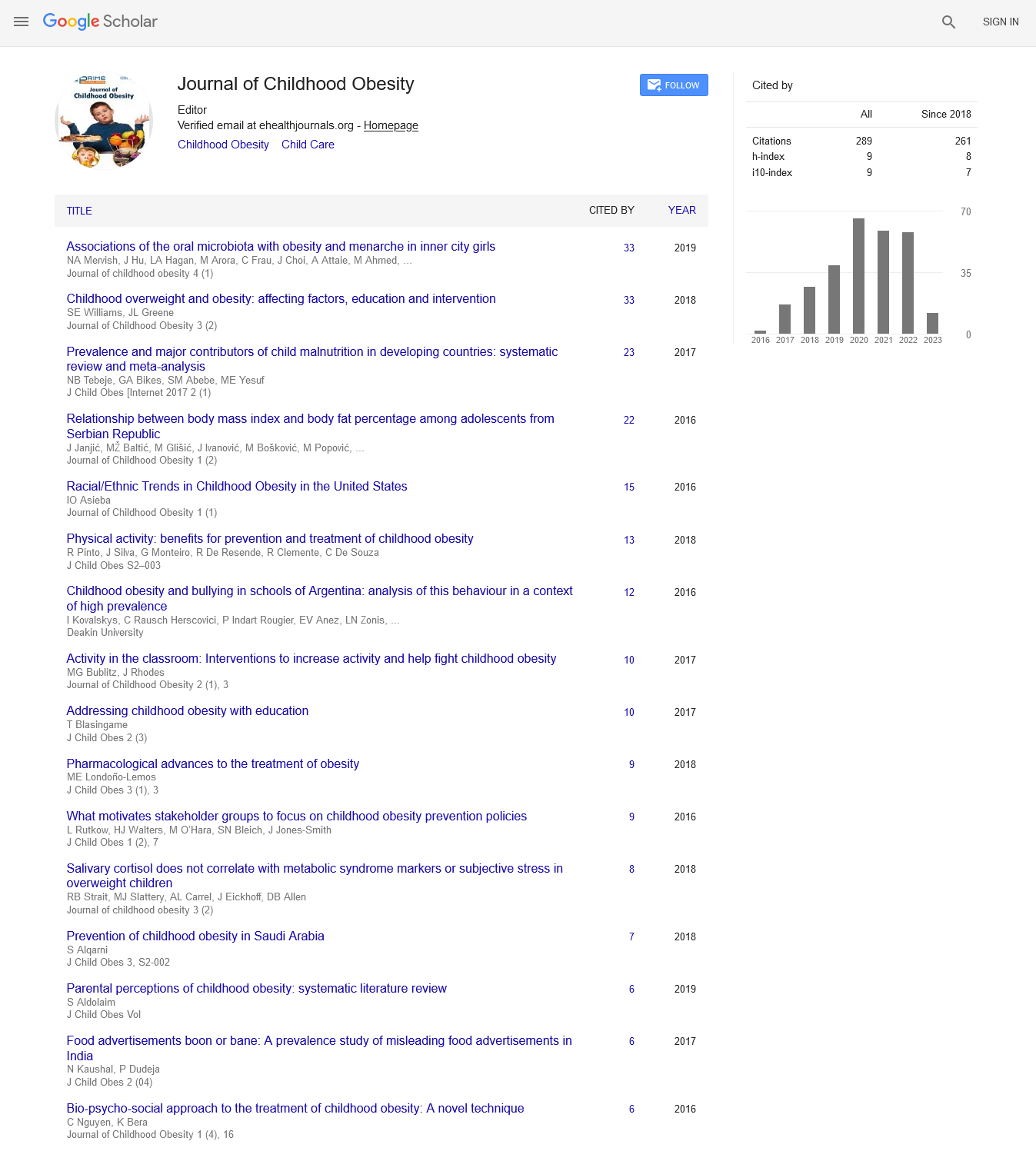Commentary Article - (2024) Volume 9, Issue 1
Navigating the Challenges Multifaceted Approach of Child Obesity in Weight Management
Oliver Bryant*
Department of Obesity, University of Buffalo, USA
*Correspondence:
Oliver Bryant,
Department of Obesity, University of Buffalo,
USA,
Email:
Received: 31-Jan-2024, Manuscript No. ipjco-24-19174;
Editor assigned: 02-Feb-2024, Pre QC No. ipjco-24-19174 (PQ);
Reviewed: 16-Feb-2024, QC No. ipjco-24-19174;
Revised: 21-Feb-2024, Manuscript No. ipjco-24-19174 (R);
Published:
28-Feb-2024, DOI: 10.21767/2572-5394-24.9.04
Introduction
In an era where convenience often trumps health, the
prevalence of child obesity has become a significant public
health concern worldwide. While genetics and environmental
factors play roles, the fundamental cause often boils down to
an imbalance between calorie intake and energy expenditure.
Tackling child obesity requires understanding its complexities,
addressing underlying factors, and implementing effective
weight management strategies tailored to the unique needs
of children. Child obesity not only affects physical health but
also impacts emotional well-being and social interactions.
Children grappling with obesity often face ridicule, bullying,
and social isolation, leading to low self-esteem and poor body
image. This psychological toll can further exacerbate unhealthy
eating habits and sedentary behaviors, perpetuating the cycle
of obesity. One of the primary challenges in managing child
obesity is addressing the multifactorial nature of the condition.
While dietary changes and increased physical activity are key
components of weight management, successful interventions
must also consider genetic predispositions, environmental
influences, and psychosocial factors. This holistic approach
requires collaboration among healthcare professionals,
educators, policymakers, and families to create supportive
environments that promote healthy lifestyles. Dietary
interventions play a central role in weight management for
children with obesity. Emphasizing nutrient-dense foods
such as fruits, vegetables, whole grains, and lean proteins
while limiting calorie-dense, processed foods high in sugars
and unhealthy fats can help children achieve and maintain a
healthy weight.
Description
Similarly, promoting physical activity is essential for combating
child obesity and promoting overall health. Encouraging
children to engage in regular physical activity, such as outdoor
play, sports, and active transportation, helps burn calories,
build muscle, and improve cardiovascular fitness. Schools can
also play a role in promoting physical activity by incorporating
movement breaks, physical education classes, and
extracurricular sports programs into the curriculum. In addition
to dietary and physical activity interventions, addressing the
underlying factors contributing to child obesity is essential for
long-term success. This may include identifying and addressing
emotional triggers for overeating, teaching coping mechanisms
for dealing with stress and boredom, and fostering a positive
body image and self-esteem. Counseling and support services
can also help children and families navigate the challenges of
weight management and develop sustainable lifestyle habits.
Furthermore, addressing environmental influences on child
obesity is crucial for creating supportive environments that
facilitate healthy choices.
Conclusion
In conclusion, addressing child obesity requires a
comprehensive and collaborative approach that considers the
multifactorial nature of the condition. By promoting healthy
eating habits, encouraging regular physical activity, addressing
underlying factors, and creating supportive environments, we
can empower children and families to achieve and maintain a
healthy weight. Together, we can navigate the challenges of
child obesity and pave the way for a healthier future for all
children.
Acknowledgement
None.
Conflict Of Interest
The author’s declared that they have no conflict of interest.
Citation: Bryant O (2024) Navigating the Challenges Multifaceted Approach of Child Obesity in Weight Management. J Child Obesity. 9:04.
Copyright: © 2024 Bryant O. This is an open-access article distributed under the terms of the Creative Commons Attribution License, which permits unrestricted use, distribution, and reproduction in any medium, provided the original author and source are credited.

